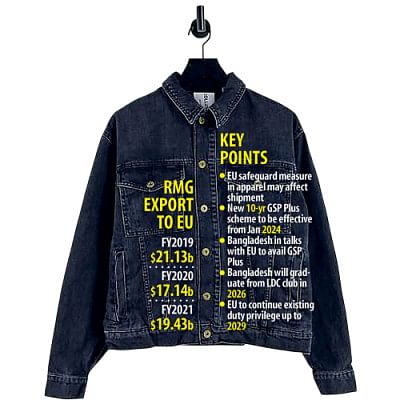Proposed EU move could strip garment shipment of duty benefit

A measure proposed by the European Union may affect Bangladesh's robust apparel shipment to the bloc even if the country is awarded the Generalised System of Preferences (GSP) Plus status after its graduation to a developing nation.
In the proposed GSP Plus scheme, the EU said if the value of a particular garment item from a country eligible for duty-free export benefit under the bloc's Everything But Arms (EBA) facility crosses 6 per cent of the total imported value of apparel, the zero duty facility will not be applicable for the product even if the GSP Plus status is granted, said Commerce Secretary Tapan Kanti Ghosh.
The value of the total imported apparel from Bangladesh to EU countries has already gone past the threshold and now stands at more than 9.74 per cent if the import value of clothing items in 2019 is considered.
EU member states bought clothes worth 154 billion euro from outside of the bloc in 2019. Of the sum, 15 billion euro went from Bangladesh, which is 19 per cent of the total, Eurostat data said.
"We will launch an intense negotiation with the EU about the 6 per cent safeguard measure," said Ghosh.
The secretary also said a technical committee of the ministry was working on the issue to get the detailed picture and assess the implication of the safeguard measure.
Ghosh will raise the issue when he meets with Charles Whitley, the EU ambassador to Bangladesh, at his office at the secretariat today.
"If necessary, we will launch negotiation with the EU Trade Commissioner," said the secretary.
Rubana Huq, a former president of the Bangladesh Garment Manufacturers and Exporters Association, said the safeguard measure would be applicable to higher value-added products, not volume.
"This will give us a serious advantage," Huq replied in a message on WhatsApp.
The EU is the largest export destination for Bangladesh.
Currently, 58 per cent of the total export and 64 per cent of total garment items in particular of the country is destined to the continent.
Dhaka is negotiating with the EU to continue enjoying trade benefits for a three-year period to 2029 after its graduation from the grouping of the least-developed countries in 2026.
The new GSP Plus scheme will come into effect from January 2024 and will continue up to 2034.
Abdur Razzaque, a director of the Policy Research Institute of Bangladesh, said as per the proposed GSP provisions, Bangladesh is likely to qualify for the GSP Plus after the graduation. But the specified EU 'safeguards' would exclude the country's clothing exports from any tariff preferences.
The proposed GSP has removed the import share criterion, which stipulated that a country's share in EU GSP-covered imports in 2019 can't be more than 7.4 per cent.
Bangladesh is a major clothing exporter, and almost all of it is exported duty-free. Its share in the EU-GSP covered imports was much higher than 7.4 per cent.
"Bangladesh will not qualify for GSP Plus under the existing GSP rules. So, the proposed removal of import share criterion is welcome news for Bangladesh," said Razzaque in an email.
However, the proposed EU GSP rules specify that if the combined share of HS Sections 61, 62, and 63 (comprising knitwear, woven and home textile items and defined as "product group S-11b") from a country exceeds 6 per cent of the total EU imports of the same products, safeguard measures would be triggered to remove the duty-free market access for these products.
"All this implies that Bangladesh will benefit from GSP Plus preferential access. However, its apparel items will face MFN (most-favoured nation) tariff rates in the EU."
The noted researcher described the safeguard measures on textile and clothing as contradictory to the intent of the proposed new regime.
"In the preamble to the new proposal, it is stated that product graduation should not apply to GSP Plus and EBA beneficiary countries. But the likely exclusion under safeguards will be tantamount to product graduation."
If the proposed rules remain unchanged, the average tariff on apparel exports from Bangladesh to the EU will rise from the currently zero to an average of 12 per cent, according to Razzaque.
The new proposals will be final when adopted by the European Parliament and the European Commission, the executive branch of the EU. Adoption could take place in the last quarter of 2022.

 For all latest news, follow The Daily Star's Google News channel.
For all latest news, follow The Daily Star's Google News channel. 




Comments